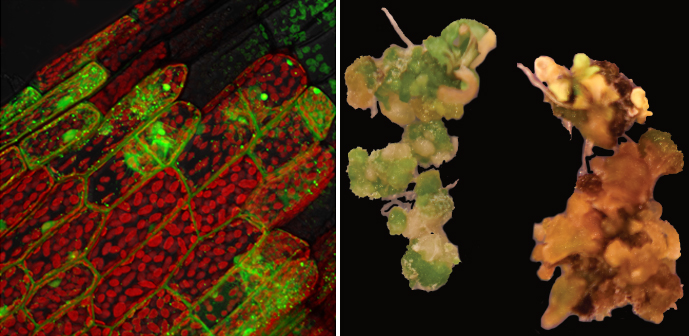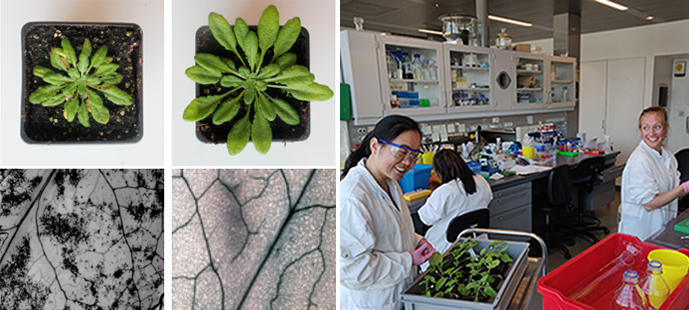Innate immunity and cellular reprogramming at the Petersen and Rodriguez group


Using a combination of cellular and molecular biology we strive to understand how cellular decision making is regulated in plants, with emphasis on immunity and development. We then apply our toolkit to distant model species to gain perspective on how these processes evolved in plants.
Our research focus can be subdivide into 2 main questions:
- What are the true function of effector targets in immunity?
- How do cells reset their identity to form stem cells?
Exploiting microbial effector targets to increase immunity.
Recycling mechanisms impact on cellular decision making.
|
Dr. Yasin Dagdas, Group leader at GMI, Austria Prof. Hans thordal Christensen, Group Leader at PLEN, Copenhagen University, Denmark Prof. Søren Sørensen, Group Leader at the Section for Microbiology, Copenhagen University, Denmark. Chr. Hansen A/S, Global Bioscience Company, Hoersholm, Denmark. Prof. Susanne Brix Pedersen, Group leader of the Disease Systems Immunology group, DTU, Denmark Prof. Karsten Kristiansen, Group leader of the Laboratory of Genomics and Molecular Biomedicine, Copenhagen University, Denmark. Prof. Mitsuyasu Hasebe, Group leader of Hasebe Lab, NINS, Japan.
|
Rodriguez et al 2020, Autophagy mediates temporary reprogramming and dediffernatiation in plant somatic cells. EMBOJ
Rodriguez et al 2018, DNA damage as a consequence of NLR activation. PLOS Genetics
Lolle et al 2017, Matching NLR Immune Receptors to Autoimmunity in camta3 Mutants Using Antimorphic NLR Alleles, Cell Host & Microbe
Bressendorf et al 2016, An innate immunity pathway in the moss Physcomitrella patens, Plant Cell
Roux et al 2015, The mRNA decay factor PAT1 functions in a pathway including MAP kinase 4 and immune recptor SUMM2, EMBOJ
Munch, Rodriguez et al 2014, Autophagy deficiency leads to accumulation of ubiquitinated proteins, ER stress, and cell death in Arabidopsis, Autophagy.
Palma et al 2010, Autoimmunity in Arabidopsis acd11 is mediated by epigenetic regulation of an immune receptor. Plos Pathogens.
Hofius et al 2009, Autophagic components contribute to hypersensitive cell death in Arabidopsis. Cell
Qiu et al 2009, Arabidopsis MAP kinase 4 regulates gene expression through transcription factor release in the nucleus. EMBOJ
Andreasson et al 2005, The MAP kinase substrate MKS1 is a regulator of plant defense responses. EMBOJ
Brodersen, Petersen et al 2002, Knockout of Arabidopsis accelerated-cell-death11 encoding a sphingosine transfer protein causes activation of programmed cell death and defense. Genes & Dev.
Petersen et al 2000, Arabidopsis MAP Kinase 4 Negatively Regulates Systemic Acquired Resistance. Cell
Novo Nordisk Fonden Distinguished investigator- Exploiting microbial effector targets (2020-24) 9,683,189 DKK. PI: MP
Independent Research Fund FTP Denmark Boosting plant disease resistance (2018-21) 2,400,000 DKK PI: MP
Novo Nordisk Fonden Challenge Plants go immune (2020-25) 5,400,000 DKK allocated to MP
Independent Research Fund FTP Denmark 2021-24) Regeneration mechanisms – bacterial probiotics as tools to enhance plant productivity? PI: ER
Researchers
| Name | Title | Phone | |
|---|---|---|---|
| Rodriguez Gomes, Eleazar José | Associate Professor |
Contact
Professor
Morten Petersen
Functional Genomics
Ole Maaløes Vej 5, 2200 Kbh. N,
Biocenter, Building: 3-1-45
shutko@bio.ku.dk
Phone: +45 31 75 76 60
ORCID: 0000-0002-3035-5991
Tenure-Track assistant Professor
Eleazar Rodriguez
Functional Genomics
Ole Maaløes Vej 5, 2200 Kbh. N,
Biocenter, Building: 3-1-47
eleazar.rodriguez@bio.ku.dk
Phone: +45 93 99 00 63
ORCID: 0000-0002-3641-4980
